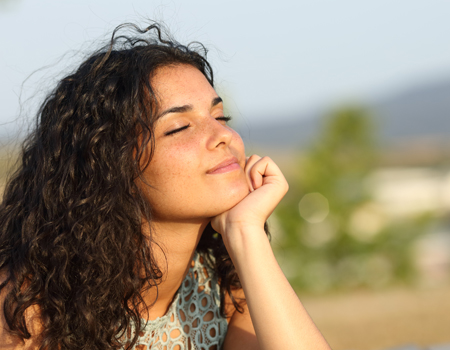 Thoughts and emotions impact our minds and bodies.
Thoughts and emotions impact our minds and bodies.
Our thoughts, emotions, and bodies intertwine and directly impact our life experiences. If we view our thoughts and feelings from a lens of acceptance, safety, and openness, then our perception of distress often changes to a perspective of hope and empowerment.
However, when our thoughts and emotions become filled with intensity, it can cause one to feel “out of control.”
Life from this place feels hectic, filled with conflict, and unmanageable.
Learning to live mindfully helps control your thoughts and emotions.
Our goal in learning and practicing self-regulation through mindfulness requires embracing whatever troubles our minds and emotions. Through these methods, we learn how to come back to the present moment and meet ourselves and whatever is happening around us with compassion and openness.
This mindful place allows us to respond intentionally instead of simply reacting to our lives and ourselves. Coming from this place is empowering as opposed to disempowering. Right? It means you are living mindfully.
Living life mindfully is a new concept and practice in Western society. However, mindfulness is a familiar concept used for centuries in the lives of many other cultures around the world.
Scientific evidence now shows us many health benefits of practicing mindfulness and meditation. It’s our turn to catch up now!
 What is mindfulness?
What is mindfulness?
Mindfulness is present moment awareness.
Mindfulness means slowing down and paying attention to our thoughts, emotions, and feelings in our body as they are happening. We do this without judgment while adopting an attitude of curiosity and compassion towards these experiences.
How does mindfulness help? Being mindfully aware of our inner and outer experiences can help us cope with difficulties and feel much better, especially if we are struggling with difficult emotions, fluctuations in our mood, or physical pain.
Mindfulness is a learned skill involving the conscious practice of stepping into a way of “being” present with whatever is happening (inside or outside of ourselves) and responding with intention, rather than reacting from an emotional response.
 Mindfulness teaches us to…
Mindfulness teaches us to…
…become more engaged in our relationships (including ourselves) and experiences in everyday life. Rather than being consumed by thoughts about the past or worrying about future uncertainties, mindfulness helps us face the moment, whatever comes our way.
We gain the ability to make day-to-day choices and respond to life and others with purpose and intention.
Being mindful allows us to become more aware of our inner experiences that include a variety of body sensations, thoughts, and emotions. It helps us “notice” those experiences, whether pleasant, unpleasant, or neutral.
We learn to regulate emotions, ride the waves of their intensity, and respond to challenges intentionally instead of reacting to or avoiding difficulties.
Mindfulness helps us relate to others and ourselves with openness, kindness, warmth, and patience.
Gain control of your thoughts and emotions through mindfulness.
Mindfulness is a simple approach to living, beneficial to everyone.
Whether dealing with trauma, a life transition, self-esteem issues, chronic pain, depression, parenting difficulties, or everyday stress amongst the hustle and bustle of our fast-paced society, mindfulness can help!
Learn to live life moment by moment and gain peace, no matter what comes your way.
Be mindful – contact me today.

